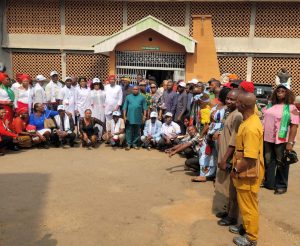Vanished in Three Days: Delta Police Arrest Landlady After Fake Tenants Disappear With Four Children in Ogwashi-Uku”
In the tranquil town of Ogwashi-Uku in Aniocha South Local Government Area of Delta State, life flows with predictable rhythms. Families go about their business, children play freely in family compounds, and neighbors share food, laughter, and trust.
The community is still reeling from the mysterious disappearance of four young children—Ebube Nwafido (6), her younger sister Miracle (3), and two other girls, Chimanda (7) and Excel, popularly known as “Tinubu” (5). The suspected abductors? Two seemingly harmless women posing as new tenants, who had barely spent three days in the neighborhood before vanishing without a trace.
YOU MAY READ
They Came as Tenants, Left as Thieves”: Delta Community in Shock as Three Women Disappear with Four Children Days After Renting a Room
This act of brazen deceit and alleged child trafficking has left a gaping wound in the hearts of families and has raised serious questions about the security gaps in Nigeria’s housing system, the vulnerabilities of children in semi-urban communities, and the role of landlords in tenant verification.
According to residents of the Umuokwe quarters in Ogwashi-Uku, the two women appeared one afternoon, claiming to be in search of affordable housing. They found it—a single room in a compound house owned by an elderly woman.
The landlady, whose name remains undisclosed due to the ongoing investigation, allegedly handed over the room to the women without any formal agreement, identification, or contact details—a violation not only of common sense but of basic tenancy laws.
“They just said they needed a place to stay. The landlady didn’t ask too many questions,” one neighbor told reporters. “They paid in cash and moved in the same day.”
To the unsuspecting community, the women seemed polite and reserved. They kept to themselves but occasionally engaged with neighbors, particularly children. In retrospect, it was a calculated move—one that would end in devastation.
YOU MAY READ
Kidnappers Reportedly Kill Abducted Female Realtor, Shoot Police Officer in Delta
April 17, 2025, began like any other day. The children—full of energy and unaware of the lurking danger—played around the compound as they often did. But sometime in the afternoon, they were approached by the two women who reportedly lured them with promises of biscuits from a nearby shop.
None of the children returned.
“It was later in the evening when the parents began looking for their kids that the alarm was raised,” said Mrs. Ngozi Ajulu, a neighbor. “Everyone assumed the children were around the neighborhood, maybe playing somewhere.”
But by dusk, the situation turned frantic. Families searched nearby compounds, streets, and shops. Concern turned into panic. When neighbors stormed the apartment of the newly moved-in women, they were greeted by a chilling sight—an empty room, cleared of all belongings, the tenants long gone.
The community was thrown into chaos. Cries of anguish echoed through the compound as the gravity of the situation sank in. The news quickly reached the local police station, and within hours, officers arrived to begin preliminary investigations.
The first suspect was the landlady.
In a public statement, Delta State Police Public Relations Officer, SP Bright Edafe, confirmed the arrest of the landlady, explaining that her failure to document the identities of the new tenants raised red flags.
“They just came and said they wanted to rent an apartment and the landlady gave it to them with no details, no name, no phone number, no agreement. After three days, they carried four children,” Edafe said.
He added, “The landlady has been arrested because her actions are suspicious.”
Her arrest has sparked debate in the community, with some defending her as a victim of deception, while others accuse her of gross negligence or even complicity.
Nigeria is facing a child trafficking crisis. According to a 2024 UNICEF report, over 10,000 children go missing in Nigeria annually, with many believed to be trafficked domestically or across borders for forced labor, illegal adoption, begging rings, or even ritual purposes.
Delta State, alongside states like Anambra, Imo, and Edo, has increasingly become a hotbed for child trafficking due to its semi-urban settlements, porous borders, and weak enforcement of tenancy verification laws.
YOU MAY READ
The Death of a Visionary: Domestic Violence Allegations Rock Delta State Following the Tragic Demise of Governor’s Aide Shimite Winifred Bello
Human rights advocate and founder of SafeHome Nigeria, Ms. Clara Udeh, said the case in Ogwashi-Uku is “a textbook example of how trafficking networks operate.”
“They scout for communities where there is trust among neighbors, no security surveillance, and no formal tenant documentation. Once they settle in, they study the routine, identify soft targets—usually children—and vanish in days.”
With the landlady in police custody, the broader question persists—how much responsibility lies with landlords in such situations?
In Nigerian law, landlords are not mandated to run background checks on tenants, but in practice, especially in cities, it has become standard procedure to request identity documents, references, and contact information. This case, however, underscores the dangerous laxity that exists in smaller communities.
According to Delta-based legal practitioner, Barrister Martins Akinro, “Failure to record tenant information constitutes negligence. In cases where such negligence leads to criminal outcomes, the landlord may be considered an accessory to the crime, depending on the extent of knowledge or willful blindness.”
However, some voices in the community argue that the landlady, an elderly widow, may have been duped like everyone else. “She’s not an accomplice, just careless,” said a neighbor. “She’s a victim too.”
Back in the compound, the families of the missing children are inconsolable.
Mr. Johnson Nwafido, father to Ebube and Miracle, stood before journalists with tears streaming down his face. “My children are my life. What kind of country allows this to happen? Who do we turn to?”
Another parent, Mrs. Chinelo Okeke, whose daughter Chimanda was among the abducted, is demanding answers. “We trusted this community. We didn’t know we had wolves living among us.”
The emotional toll on the families is immense. Counselors and local NGOs have stepped in to provide support, but the psychological trauma is unlikely to fade soon.
As of this report, the police have launched a statewide manhunt for the two suspects. Investigators are reviewing CCTV footage from nearby shops, transport stations, and banks to trace their movements.
Interpol and the National Agency for the Prohibition of Trafficking in Persons (NAPTIP) have also been notified, in case the children are trafficked across borders.
But the challenges are steep.
With no names, phone numbers, or photographs, identifying the suspects is like chasing shadows. “We are relying heavily on eyewitness accounts and transport operators who may have seen them,” said one police officer.
Residents are urged to come forward with any information that could aid in tracking the women or recovering the children.
This case has reopened discussions about Nigeria’s broken security and identification systems.
There is currently no centralized tenant registration database, and landlords in rural or semi-urban areas are rarely monitored by local government authorities. Community surveillance systems are informal at best, and law enforcement response to missing persons—especially children—is often slow and under-resourced.
Experts are calling for the integration of the National Identification Number (NIN) system with housing databases, so tenants can be easily tracked in cases of emergency or criminal behavior.
“If we had a functional national tenant verification system, this wouldn’t have happened,” said security analyst Kingsley Ekwuribe. “These criminals exploit our loopholes, and innocent children pay the price.”
Across Nigeria, activists are rallying behind the victims’ families, demanding justice and structural reform.
The Delta State Child Rights Coalition has written to the state governor, urging him to create a special task force on child abductions and trafficking.
Religious leaders have joined the call. Reverend Dr. Emeka Okolo of the Pentecostal Fellowship of Nigeria warned during Sunday service: “We must never let this happen again. Evil thrives in silence.”
On social media, the hashtag #BringBackOgwashiChildren is gaining traction, with thousands of Nigerians posting messages of solidarity, offering information, and demanding swift action.
This tragic case presents an opportunity for Nigeria to reassess its child protection frameworks.
Ogwashi-Uku remains on edge. Parents now keep their children indoors. Compounds that once echoed with laughter now sit in eerie silence.
“This is not just a crime,” said Chief Fidelis Okonkwo, a community leader. “It’s a scar on our conscience.”
The town has announced a vigil for the four children, with candles to be lit across the Umuokwe quarters. It will be a night of mourning, reflection—and hopefully, renewed resolve.
As the nation watches this horror unfold, one thing is clear: this was preventable. Lax housing protocols, inadequate law enforcement, and general societal apathy enabled criminals to rob four families of their joy.
Let this tragedy not be in vain.
Let it spur a movement for child safety, tenant accountability, and stronger community policing.
Let it remind us that vigilance is not paranoia, that kindness must not blind us to caution, and that our children are not negotiable.





